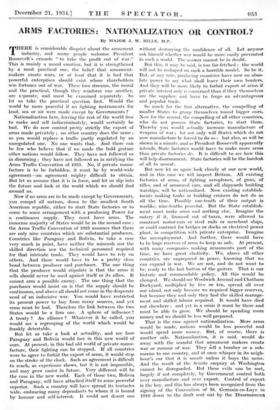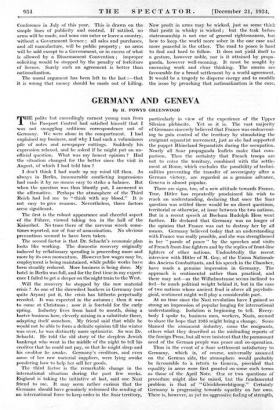ARMS FACTORIES : NATIONALIZATION OR CONTROL?
By MAJOR J. W. HILLS, M.P.
THERE is considerable disquiet about the armament industry, and many people welcome President Roosevelt's crusade " to take the profit out of war." This is mainly a moral emotion, but it is strengthened by a most practical one, the belief that armament- makers create wars, or at least that it is bad that powerful enterprises should exist whose shareholders win fortunes out of war. These two streams, the moral and the practical, though they reinforce one another, are s-Tarate, and must be examined separately. So let us take the practical question first. Would the world be more peaceful if no fighting instruments for land, sea or air were made except by Governments ?
Nationalization here, leaving the rest of the world free to make and sell indiscriminately, would certainly be bad. We do now control pretty strictly the export of arms made privately ; no other country does the same : so you would replace a traffic partly regulated by an unregulated one. No one wants that. And there can be few who believe that if we made the bold gesture other nations would follow. They have not followed us in disarming ; they have not followed us in ratifying the Arms Traffic Convention of 1925. No, if private manu- facture is to be forbidden, it must be by world-wide agreement—an agreement mighty difficult to obtain. But let us assume that it is in force, and let us slip into the future and look at the world which we should find around us.
Now if no arms are to be made except by Governments, you compel all nations, down to the smallest South American republic, either to start State factories or to come to some arrangement with a producing Power for a continuous supply. They must have arms. The immense majority of States would be in the second case : the Arms Traffic Convention of 1925 assumes that there are only nine countries which are substantial producers. Countries like Paraguay and Bolivia, to take a case very much in point, have neither the minerals nor the skilled direction nor the technical personnel required for that intricate trade. They would have to rely on others. And there would have to be a pretty close bond between producer and purchaser. The one thing that the producer would stipulate is that the arms it sells should never be used against itself or its allies. It cannot arm a possible enemy. The one thing that the purchaser would insist on is that the supply should be continuous, and above all should not cease in the desperate need of an indecisive war. You would have restricted its present power to buy from many sources, and yet arms must be had. Therefore the link between the two States would be a firm one. A sphere of influence ? A treaty ? An alliance ? Whatever it be called, you would see a regrouping of the world which would be frankly detestable.
But let us take a look at actuality, and see how Paraguay and Bolivia would fare in this new world of ours. At present, in this bad old world of private manu- facture, their fighting can be stopped. If all countries were to agree to forbid the export of arms, it would stop on the stroke of the clock. Such an agreement is difficult to reach, as experience shows, but it is not impossible, and may grow easier in future. Very different will be the case in the new world. Each of those two, Bolivia and Paraguay, will have attached itself to some powerful superior. Such a country will have spread its tentacles wide, embracing many dependants to whom it is bound by honour and self-interest. It could not desert one without destroying the confidence of all. Let anyone ask himself whether war would be more easily prevented in such a world. The answer cannot be in doubt.
But this, it may be said, is too far-fetched ; the world will not be reshaped on such a horrible model. So be it. But, at any rate, producing countries have now an abso- lute power to say what shall leave their own borders. And they will be more likely to forbid export of arms if private interest only is concerned than if they themselves are the supplier, and have to forgo an advantageous and popular trade.
So much for the first alternative, the compelling of smaller States to group themselves round bigger ones. Now for the second, the compelling of all other countries, who do not possess State factories, to start them. Thereby you would actually increase manufacture of . weapons of war ; for not only will States which do not now manufacture be forced to do so ; but also, as will be shown in a minute, and as President Roosevelt apparently intends, State factories would have to make more arms than private factories do. It is difficult to see how this will help disarmament. State factories will be the hardest of all to unseat.
But now let us again look closely at our new world, and in this case we will inspect Britain. All existing factories of arms, of fighting aeroplanes, of guns, of rifles, and of armoured cars, and all shipyards building warships, will be nationalized. Now existing establish- ments making tanks or building cruisers do not do so all the time. Possibly one-tenth of their output is warlike, nine-tenths peaceful. But the State establish- ment must make arms and nothing else. Imagine the outcry if it, financed out of taxes, were allowed to construct motor-cars or steel rails or merchant ships, or could contract for bridges or docks or electrical power plant, in competition with private enterprise. Imagine the unemployment. And further, there would have to be huge reserves of arms to keep us safe. At present, with many companies making armaments part of the time, we have great elasticity. We, above all other countries, are unprepared in peace, knowing that we can expand in war. We are not, and do not want to be, ready to the last button of the gaiters. That is our historic and commendable policy. All this would be changed. We should see Woolwich Arsenal and Chatham Dockyard, multiplied by five or ten, spread all over our island, not only because we required bigger reserves, but because they and only they had the skilled manage- ment and skilled labour required. It would have died out elsewhere ; and yet in a crisis it must be there and must be able to grow. VVe should be spending more money and we should be less well prepared. That is the case against nationalization. More arms would be made, nations would be less peaceful and would spend more money. But, of course, there is another side. Nationalization, it is said, would do away with the scandal that armament makers create war or rumour of war. They sell a bomber or a sub- marine to one country, and at once whisper in its neigh- bour's ear that it is unsafe unless it buys the same. And the result of the Senate enquiry at Washington cannot be disregarded. But these evils can be met, largely if not completely, by Government control both over manufacture and over export. Control of export is the key, and this has always been recognized from the signing of the Convention of St. Germain-en-Laye in 1919 down to the draft sent out by the Disarmament' Conference in July of this year. This is drawn on the simple lines of publicity and control. If ratified, no arms will be made, and none can enter or leave a country, without a Government licence ; all sales and purchases, and all manufacture, will be public property ; no arms will be sold except to a Government, or in excess of what is allowed by a Disarmament Convention ; improper soliciting would be stopped by the penalty of forfeiture of licence. Surely such an agreement is better than nationalization.
The moral argument has been left to the last :—that it is wrong that money should be made out of killing. Now profit in arms may be wicked, just as some think that profit in whisky is wicked ; but the task before statesmanship is not one of general righteousness, but how to keep the world more sober in the one case and more peaceful in the other. The road to peace is hard to find and hard to follow. It does not yield itself to a gesture, however noble, nor is it attained by propa- ganda, however well-meaning. It must be sought by unceasing work and clear thinking. The omens arc favourable for a broad settlement. by a world agreement. It would be a tragedy to disperse energy and to muddle the issue by preaching that nationalization is the cure.



































 Previous page
Previous page